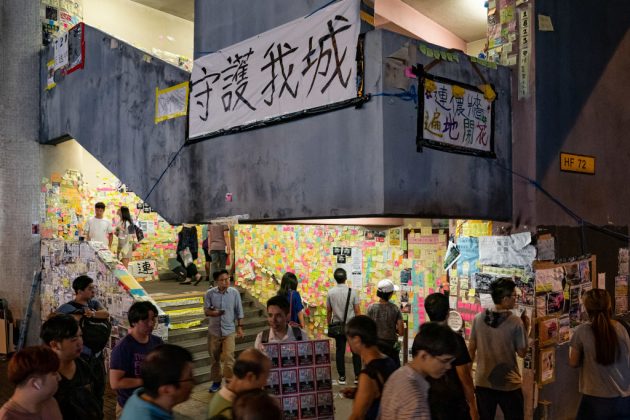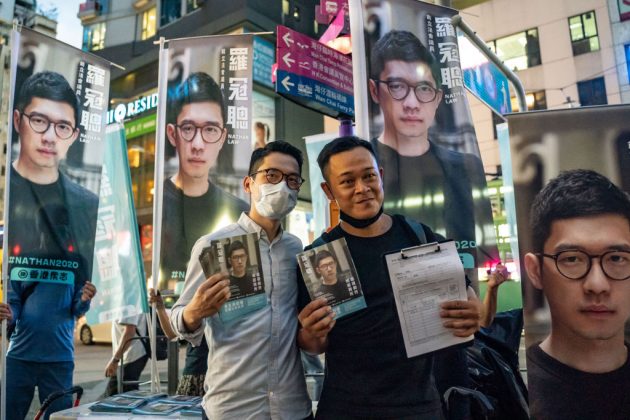Nathan Law: I’m not entitled to lose hope in Hong Kong’s struggle

City A.M. Editor Andy Silvester talks to Nathan Law, a pro-democracy activist from Hong Kong and one of TIME Magazine’s 100 most influential people on the planet – discussing the territory’s battle against repression, Beijing’s war on free expression and the need for a global solution to authoritarianism
Nathan Law should not be in London as he speaks to City A.M.
He should, in fact, be preparing for another election in Hong Kong – trying to win a seat on the territory’s Legislative Council.
But, spooked by Beijing’s imposition of a draconian National Security Law, he fled.
“We understood,” he tells us, “that that would be an extremely harsh law that would quash our freedom of expression and other sorts of freedom.”
China said the legislation would secure Hong Kong’s status as a secure financial centre, having been rocked by popular uprisings against creeping authoritarianism in 2014 and 2019.
Law, and almost all impartial observers, saw it differently. “On June 30, the Government circumvented all the logical legislation and consultation process and they imposed the law in Hong Kong.
“It grants the Government a sweeping power to prosecute people who are allegedly breaching the law with subversion, collusion with foreign forces.
“But in fact, if you look back to the implementation for the past half year, the Government has arrested nearly a hundred people, most of them for speech crimes.”
One such is Joshua Wong, a fellow leader of the Umbrella Movement. Law was 21 at the height of the protests; Wong was 18. The sight of two youngsters leading a protest against the Chinese Communist Party captivated the world – David vs. Goliath has rarely had a more evocative 21st century equivalent.
Both Law, now 27, and Wong have spent time behind bars – and Wong is again inside.
“He was arrested a week ago in a mass crackdown. A month before, he was already sentenced 13.5 months for his participation in peaceful protests in 2019. When he was in jail last week, the police raided his home,” Law says.
They don’t know when he will be released – the National Security Law can allow sentences of anything up to lifelong imprisonment.
“It’s very scary for Hong Kong, and most of us feel like we have lost all sorts of freedom, especially freedom of expression, because of this speech crime. Everyone is living in fear.”
Reasons to doubt
Law has reason to question Beijing’s authority. In 2016, two years after the Umbrella Movement protests, he was elected to the territory’s pseudo-democratic Legislative Council.
At 23 he was the youngest ever elected legislator in Hong Kong and indeed the whole of Asia.
But he wasn’t able to take his seat for very long. Law intonated upwards when professing Hong Kong’s fealty to China, essentially making it a question. Such mild dissent had long been de rigeur for democratic campaigners elected to the body, and it had long been tolerated – the Council is skewed towards pro-Beijing elements as a result of its composition – but not this time.
Law and five others were barred from taking their seat. Even in a territory used to the creeping authoritarianism of the Chinese Communist Party – and before that, wary of colonial overreach by the UK – it was a shocking example of Beijing’s apparent willingness to act with impunity.
He had intended to win his rightful seat back. But exile, instead, seemed the only way to remain out of jail – and free.

A global fight
You could imagine that Wong, a bright, young, worldly individual would sometimes wonder if it was all worth it – a life now spent albeit comfortably on the run, and many of his closest friends either in jail or under tremendous pressure. Not so.
The protests weren’t just worth it for their own sake, but for waking up the West, Law believes.
Democratic governments, he says, have had a “quite dramatic transformation when they see China, from a potential partner to a major threat.”
“In the US that consensus is quite mature,” he reckons, and not one that will backslide in the years to come.
Lobbying from Hong Kongers, including Law and Wong who gave evidence to Congressional bodies, saw the imposition of significant sanctions on Chinese firms and goods as a response to the restrictions on the territory.
He says there has been an “awakening” as a result of the protests, and indeed the growing evidence of China’s repressive actions towards Uighur Muslims in Xinjiang.
The UK has moved on a similar path to the US. Huawei has been stripped out of the UK’s 5G mobile networks, and a new takeover law will make it more difficult for Chinese companies to acquire UK firms, especially those considered to be part of the country’s critical infrastructure.
Just last week further sanctions were announced by Foreign Secretary Dominic Raab in response to both the activities of the CCP in Hong Kong and Xinjiang.
The EU, however, has taken a different path, signing an investment agreement with China. Beijing has committed to work towards global standards on forced labour and human rights, but critics say the warm words amount to very little in practice.
Law is disappointed. “I hope that European countries could adopt a much more assertive approach to cope with the authoritarian expansion by China.”

The colour of money
Cracking down on dissent and freedom of expression, as well as the seemingly arbitrary locking up of opponents, is straight out of the tried and tested dictatorial playbook. But more is at play in Hong Kong.
China’s relationship with the West is complicated by the rise of the country as a global economic superpower. There are many who say economic prosperity in the 21st century cannot be achieved without good relations with Beijing; many who argue that China’s repressive tendencies will be reined in by the country’s economic growth and the rising expectations of a new, globally conscious middle class.
Hong Kong’s experience suggests otherwise, and for Law, that’s unsurprising. And the reason for that, he says, is inherent in the very structure of the Chinese political system.
“All the money in China is coloured. They have a certain agenda beyond making profits. Every listed company in mainland China has a party branch. The Communist Party control nearly all enterprise, and the priority is not making money, but to advance the political agenda of the Communist Party.”
He says the US is more aware of that situation, with a number of firms banned from listing in New York. Here, Rishi Sunak is set to make changes to the listing regime to make the UK the most appealing place to float in the world – and there will be many who expect that to include appealing to China.
Law implies he’d like that to not be the case. “It’s an effective way to cut the infiltration (from Beijing) and the threat from China, dismantling democracy inside out.” Restricting market access to Chinese state-owned enterprises, he says, is a vital “defensive mechanism.”
Hope for the future
“As an activist, I’m not entitled to lose hope,” says Law, when he’s asked if he’s optimistic for the future of Hong Kong.
The territory is beholden to the “one country, two systems” agreement until 2047. After that, China has a free hand – and, although Beijing is hardly restraining itself currently, the end of that pact with the UK is a real concern to pro-democracy Hong Kongers.
But, though Law is “quite pessimistic” in the short-term, he has hopes for the future.
“I’m very hopeful, because we all understand that the way the Chinese Government reacts (to dissent) is not sustainable.
“The international isolation is getting more intense, and they are also facing a lot of domestic problems,” he explains.
But he sees Hong Kong’s quest for freedom as a global fight.
“When we think of the problem of authoritarianism, we don’t think in a form like climate change. We think that it’s just a regional problem, a problem in its own country.
“But that’s the wrong framing of the problem, because in this globalised and interconnected era, these are sophisticated authoritarian countries, they have plenty of tools to influence the world and make the world walk in the wrong direction.
“And I think that is the reason why we’ve been talking about the recession of democracy for the past decade.
“We haven’t seen it as a global problem and as urgent as some of the others, like climate change, and to work together and to address it.
“So I really do hope that the example of Hong Kong is to show how globalised the authoritarian expansion problem is, and we have to come up with a global solution.”